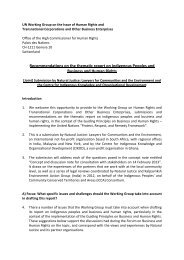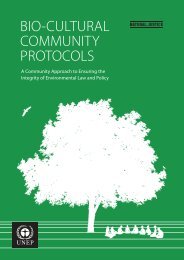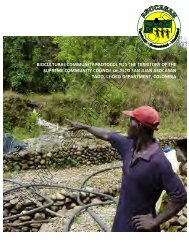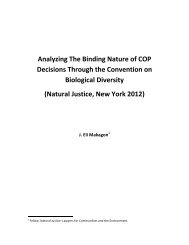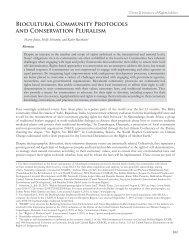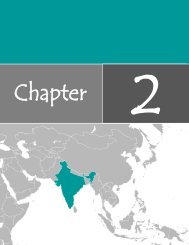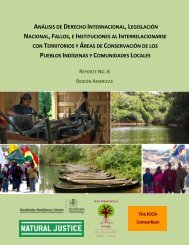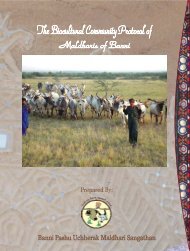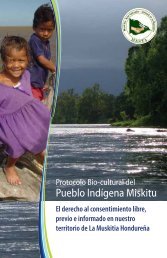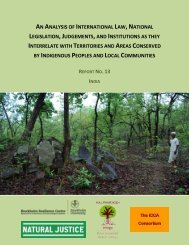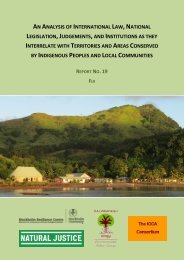English - Natural Justice
English - Natural Justice
English - Natural Justice
Create successful ePaper yourself
Turn your PDF publications into a flip-book with our unique Google optimized e-Paper software.
Conservation and environmental organizations (including NGOs, policy and researchinstitutes, parastatal agencies, intergovernmental organizations, and networks, amongothers) must fully respect and uphold international human rights and embrace newparadigms of governance diversity and good governance, including a greater focus onIndigenous peoples’ and local communities’ rights and their ICCAs and genderconsiderations. Similarly, human rights and development organizations should mainstreamthe environment into their approaches and programmes as a fundamental aspect ofsecuring human rights.5.2 National LevelThe most important recommendations of this report are for governments to recognize andensure the effective recognition and enforcement of Indigenous peoples’ and localcommunities’ rights, including their rights to territories and resources, to self-governmentthrough their own traditional governance structures, and to provide or deny FPIC for anyprojects or activities that might affect them or their territories. It is also critical to supportingIndigenous peoples and local communities, both women and men therein, to engage in thedevelopment and implementation of laws and to increase effective access to justice.Governments are called on to legislate for socio-ecological systems and implement laws inan integrated and mutually supportive manner.a. Recommendations for Overall Legal Reform at the National LevelA number of overall legal reforms and systemic changes are required to secure the rights ofIndigenous peoples and local communities, including in relation to their ICCAs. Respect and Uphold Human RightsThere is a strong correlation between supportive provisions for human rights and Indigenouspeoples’ rights on the one hand and good governance and management of lands, territoriesand natural resources on the other. In this context, the foundation for any recognition ofICCAs is law and policy that recognize self-determination, self-governance, and ownership orcustodianship rights of Indigenous peoples over their traditional territories or other lands orwaters, including natural resources and cultural systems. It is also critically important toextend similar international standards afforded to Indigenous peoples to tribal and localcommunities who can also show a deep cultural connection to their territories, areas andnatural resources therein.Accordingly, states should ratify and ensure effective compliance with international humanrights instruments, recognizing and formalizing the rights of Indigenous peoples and localcommunities and major groups like women in accordance with international standards andobligations. States should also ensure transparency and accountability in all matters relatingto Indigenous peoples’ and local communities’ rights, including allowing UN SpecialRapporteurs and other international investigation and monitoring mechanisms to enter theircountries, and ensure the rights to freedom of speech, assembly, information, andindependent media.In many cases, this will necessitate constitutional reform to create a more enabling legalframework for Indigenous peoples’ and local communities’ rights and their ICCAs. Thisrequires higher-order transformation of power relations, governing structures, and citizens’rights.



